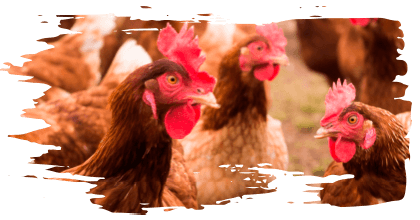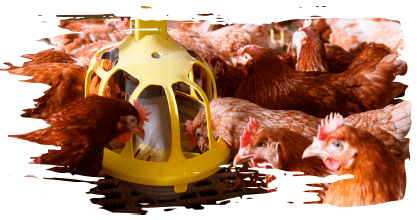OBJECTIVE
OBJECTIVE
Mycotoxins are harmful secondary metabolites originating from filamentous fungi which pose several detrimental effects on human and animal health.
![]() Apart from their alarming deteriorative health effects on livestock animals, the carryover of mycotoxins in animal-derived products, such as meat, milk, and eggs, also presents a serious risk to human health.
Apart from their alarming deteriorative health effects on livestock animals, the carryover of mycotoxins in animal-derived products, such as meat, milk, and eggs, also presents a serious risk to human health.
More than 200 mycotoxin-producing species of molds are already known and the most common harmful ones contaminating feedstuffs and feed materials include:
 Aflatoxin FB1 (AFB1)
Aflatoxin FB1 (AFB1) HT-2 toxin
HT-2 toxin T-2 toxin
T-2 toxin Ochratoxin A (OTA)
Ochratoxin A (OTA) Fumonisin B1 (FB1)
Fumonisin B1 (FB1) Zearalenone (ZEN)
Zearalenone (ZEN) Citrinin (CIT)
Citrinin (CIT)
Multicomponent mycotoxin detoxifying agent (MMDA) contains modified zeolite (clinoptilolite), Bacillus subtilis, Bacillus licheniformis, Saccharomyces cerevisiae cell wall and silymarin, and, when added to feed, it reduces gastrointestinal absorption of AFB1 and T-2 toxin in poultry.

 The present study was performed to evaluate the effects of MMDA on various performance parameters, egg characteristics, blood profile and gross examination of various organs in laying hens exposed to AFB1 and T-2 toxin via spiked maize.
The present study was performed to evaluate the effects of MMDA on various performance parameters, egg characteristics, blood profile and gross examination of various organs in laying hens exposed to AFB1 and T-2 toxin via spiked maize.
MATERIALS & METHODS
MATERIALS & METHODS
The trial consisted of 105 laying hens (Lohmann Brown) without obvious signs of disease and these hens were allocated in 7 treatment groups (35 pens).
Responses on laying performance and health status throughout the 42-day experimental period were recorded.
For comparisons, hens were fed with uncontaminated basal diet without or with addition of MMDA at 2 g/kg feed.

RESULTS
RESULTS
 Dose-dependent pathological changes in the liver and kidneys and their relative weights, as well as changes in blood parameters and reduced eggshell weights were observed in the hens fed AFB1 and T2-toxin.
Dose-dependent pathological changes in the liver and kidneys and their relative weights, as well as changes in blood parameters and reduced eggshell weights were observed in the hens fed AFB1 and T2-toxin.
The pathological changes in the hens fed diets containing AFB1 and T2-toxin without MMDA were significantly higher as compared with the control group, but eggshell stability was not affected.
The presence of AFB1, T2-toxin and their metabolites in liver and kidney tissues were significantly decreased in the hens supplemented with MMDA at 2 and 3 g/kg in feed.
| MMDA supplementation significantly reduced the deposition of AFB1, T2-toxin and their metabolites in liver and kidneys at the maximum tolerated dosage (2 and 3 g/kg) indicating remediation of AFB1 and T-2 toxin in the digestive tract as compared to the corresponding diets without MMDA. |
Exposure to AFB1 and T2-toxin can lead to significantly decreased egg mass with increasing mycotoxin levels up to the maximum tolerated dosage because of the significantly reduced egg production.
Authors
Jog Raj1, Hunor Farkaš1, Zdenka Jakovčević1, Marko Vasiljević1, Rakesh Kumar2 and Rajesh Kumar Asrani2
1Patent Co, DOO., Vlade Ćetković 1A, Mišićevo 24211, Serbia.
2Department of Veterinary Pathology, DGCN College of Veterinary and Animal Sciences, CSK Himachal Pradesh Agricultural University, Palampur, Himachal Pradesh 176062, India.
Raj, J. et al. (2023) ‘Effects of supplemented multicomponent mycotoxin detoxifying agent in laying hens fed aflatoxin B1 and T2-toxin contaminated feeds’, Poultry Science, 102(8), p. 102795. doi:10.1016/j.psj.2023.102795.




 Micotoxicosis prevention
Micotoxicosis prevention